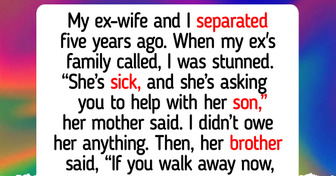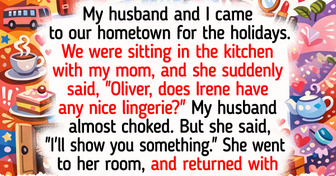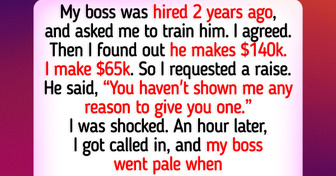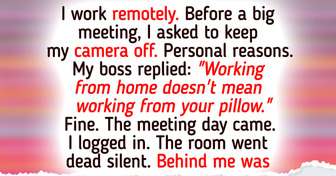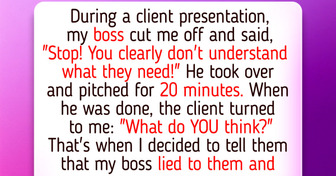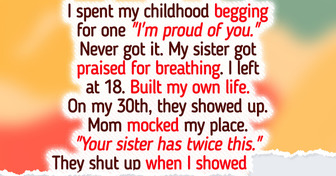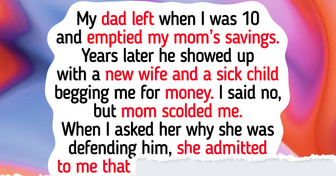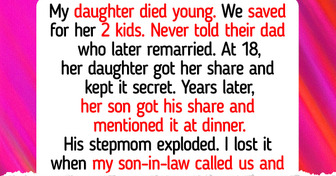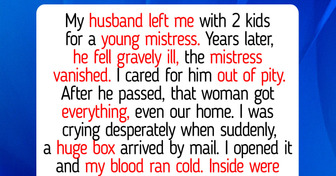My Son Got Sick and I Still Went to Work—My Husband Got Mad and Made Things Worse
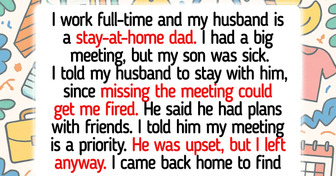

A lot of parents depend on their oldest child to support their family. The child helps with the chores, they become the emotional support their siblings need, and are supposed to back up the parents. So it’s easy to mistake their resilience for strength. But those children might have a different story to tell.

My husband’s health is declining, and I have arthritis and will need surgery soon. We’re both retired and scared. When we asked our eldest daughter for help with medical costs, she yelled, “I don’t owe you a thing!” It really stung, but she was right.
I thought it was all she had to say, but then she continued, “You have to realize that you always made me feel used.” I thought I misheard her at first. But she was just beginning. She added, “My entire childhood felt like one long unpaid job. And now you want more?”
She said she’d come home from school, exhausted, but she still had a whole list of things we expected her to do. But it was what she said next that really stuck with me. She told me that I believed it was normal, and she was right.
The thing that I didn’t realize was that it wasn’t such a good thing. For her, being mature wasn’t a personality trait. It was a coping mechanism, one she built because she didn’t feel like she was allowed to be a child.
“You always relied on me, but never understood that I was a child, too. I also needed to be protected. I also wanted to have fun. But I wasn’t allowed to.” I didn’t know what to say. I wanted to tell her she was wrong, to defend myself, but I couldn’t.
“When my brothers failed, struggled, and made mistakes, you were there for them. You were soft and caring. You let them be kids. When I saw that, I couldn’t help but wonder why I didn’t get the same treatment.”
Those words crushed me. I thought I was doing my best, giving them everything they needed. But the truth was that I was making things worse.
We leaned on her because we knew that she was capable of handling it. But now realize that all we were doing was holding her back from doing all the things she loved.
Since that day, she has cut off all contact with us. I have sent her one message after another, but she doesn’t reply. She doesn’t even read them. And I’m not doing it because of the money. I’m doing it because I want my daughter back. I want to try to apologize for everything I’ve put her through.
Thank you for reaching out. We understand how difficult a situation like this can be. Below are a few tips that might help in a situation like this one.

A lot of parents try to focus on praising their child’s helpfulness. But that isn’t the only quality to look out for. If the child only gets praised for being helpful, they learn to perform, but they’re never really able to express themselves. They learn that it isn’t okay to complain because for them, it’s just another part of their lives. But that doesn’t mean it doesn’t take an emotional toll on them.

It’s okay for children to have chores and contribute to the family when and where they can, but it shouldn’t be their sole focus. You still need to allow them to be a child. That is when and where they learn some of life’s harsher lessons.
When making jokes like “You’ll take care of us one day,” you’re unknowingly putting an expectation on your child that they will take with them into adulthood. Instead of making such jokes, you should make space for humor that doesn’t tie their identity to obligation. They should always know that you value them for who they are, not what they do.
An apology won’t fix the damage that has been done, but it does show that you understand where you might’ve gone wrong. In a case like this, don’t try to defend your actions or intentions. Try to listen to what they have to say, understand their point of view, and put yourself in their shoes.
When a child is raised to be strong, they often struggle when they reach adulthood because they have missed out on so many experiences that were supposed to help them grow. As a parent, may not have had the best intentions, but it doesn’t always mean that you’re right.

